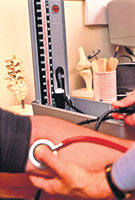
| Keeping high blood pressure at bay A little change in lifestyle can keep this medical condition under check Coronary heart disease kills more than 7 million people each year and strokes kill nearly 6 million. High blood pressure is a significant contributing factor in about 50% of cases. Many people have high blood pressure without realizing it, yet it is one of the medical conditions that responds well to lifestyle modifications and/or medication. Start taking action today and reap the benefits of better health tomorrow! High Blood Pressure - bare facts High blood pressure often has no external symptoms. Many people suffer from high blood pressure without knowing it and, in most countries, up to 30% of adults suffer from high blood pressure and a further 50% - 60% would be in better health if they reduced their blood pressure.
High blood pressure is in fact, one of the most preventable causes of premature death and illness in later life worldwide. Hence, high priority should be given to preventing and treating high blood pressure, with four priority actions: these are monitoring, diet, lifestyle and medication. Controlling your blood pressure Monitoring Having your blood pressure checked is the first step. A blood pressure test at your doctor's is quick and painless. A single high reading doesn't mean you have high blood pressure as everyone's blood pressure normally varies throughout the day. High blood pressure can only be diagnosed with certainty if your blood pressure readings are persistently high at two or more visits to your doctor's. Visit your doctor and seek his/her advice today. Adopting a healthy lifestyle Lifestyle modifications demonstrated to lower blood pressure include:
Weight reduction The greater total body mass, the more blood is needed to supply oxygen and nutrients to the body's organs and tissues. The volume of blood circulated through blood vessels increases and creates extra force on the artery walls. In addition, fat cells produce chemicals that stimulate blood vessels and the heart to work at higher pressure. In both cases, higher blood pressure is the outcome. When body weight is reduced, the force on the arteries correspondingly decreases, thereby lowering blood pressure. Research has shown that weight reduction, even by a little reduces blood pressure in a large percentage of overweight persons with high blood pressure, makes blood pressure medications more effective and reduces other cardiovascular risk factors. Benefits of regular physical activity Regular activity has a number of proven, positive health effects, especially on heart health. Vigorous exercise strengthens the heart as a pump, making it a larger, more efficient muscle. Even moderate activity can boost the good cholesterol levels; aid the circulatory system and lower blood pressure and blood fats. All these effects translate into reduced risk for heart disease, heart attack and stroke. Additionally regular physical activity also has mental health benefits like relieving stress and anxiety, ultimately also assisting in the lowering of your blood pressure. Moderating alcohol intake More than 1 drink per day for women and 2 drinks per day for men may contribute to high blood pressure. Alcohol has been shown to raise blood pressure by interfering with the flow of blood to and from the heart. Alcohol also interferes with the liver's ability to metabolize hormones, such as renin and angiotensin, which are important for maintaining blood pressure control. There is also some evidence that alcohol interferes with steroid production which is instrumental in maintaining blood pressure. Dietary changes A diet that is high in fruits and vegetables and low in saturated fats, especially animal fats has been shown not only to lower blood pressure, but also bring a host of other benefits for your overall health and wellbeing. Dietary changes can improve blood pressure after a relatively short time. The DASH diet The DASH (Dietary Approaches to Stop Hypertension) diet emphasizes plenty of grains, fruits, vegetables and low-fat dairy foods. It can promote weight loss and help to lower blood pressure. Getting the sodium and potassium dietary balance right Sodium is a regular part of our food supply. It is absolutely necessary for the human body to function normally. Without it, nerves and muscles would cease to function, the absorption of major nutrients would be impaired, and the body would not be able to maintain adequate water and mineral balance.
Sodium is found naturally in meats, nuts, grains, fruits, vegetables and dairy products in low amounts. However most of the sodium that is consumed by consumers in Asia is added to food in the form of salt, sauces (oyster sauce, soy sauce and fermented fish sauces etc) or in preserved foods like salted fish, salted vegetables and pickles and processed foods such as canned soup, potato chips, cheese etc. Sodium is also found in flavour enhancers such as monosodium glutamate and food preservatives such as sodium nitrate. Sodium is normally recycled through the body and it is only necessary to eat enough sodium to replace your daily losses. Sodium may be lost by the body through perspiration, secretions and normal excretory functions. The recommended intake per day is 2.4 g. of sodium which is equivalent to a 6g. teaspoon of salt. Increasing dietary intakes of calcium and magnesium and especially potassium have been found to lower blood pressure. Therefore, adopting a low sodium, high potassium, high magnesium and high calcium diet is a prudent strategy for the prevention and treatment of high blood pressure. Foods that are high in calcium and magnesium and low in sodium include calcium-enriched soy products such as tofu and soy milk, low fat dairy, nuts, seeds, and green leafy vegetables. Foods high in potassium are mainly fruit, vegetables and nuts. Medication Maintaining blood pressure within normal healthy range is essential to long term health and there are a number of medications available to those whose blood pressure remains elevated, despite modifications to lifestyle and diet. Your doctor is the best person to advise on options and monitor response to drug treatments. As blood pressure tends to rise with age, all adults can benefit from adopting some or all of these recommendations for improved control of blood pressure, so why not start today?
|
|| Front
Page | News | Editorial | Columns | Sports | Plus | Financial
Times | International | Mirror | TV
Times | Funday
Times | MediScene || |
| |
Copyright
2006 Wijeya
Newspapers Ltd.Colombo. Sri Lanka. |


